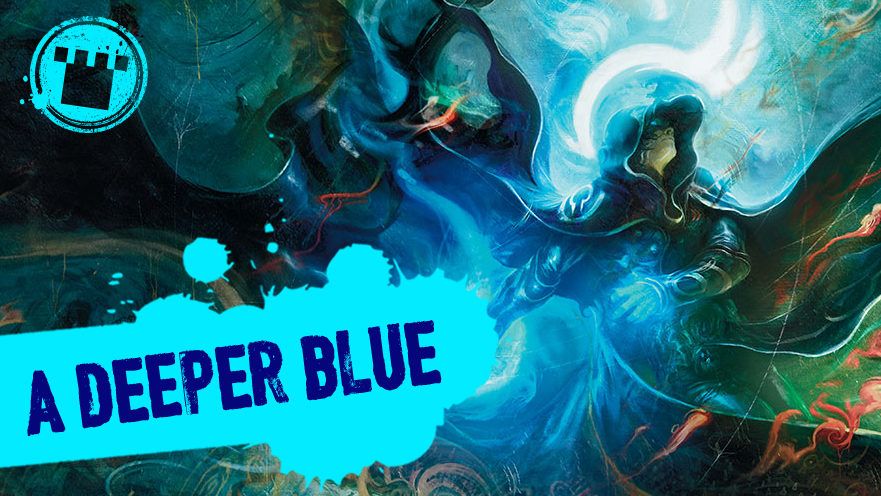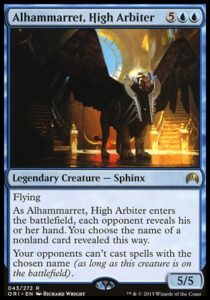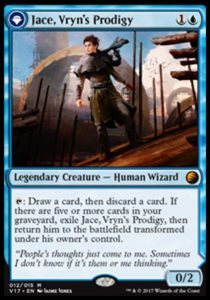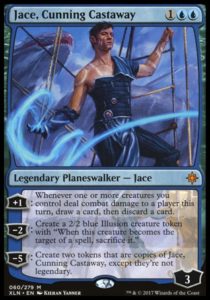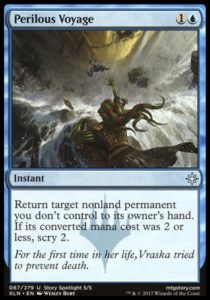Since his first appearance, Jace Beleren has become the nearest thing to a mascot for Magic: The Gathering, meant to represent the average player in all his geeky, cerebral glory. With his signature hooded blue cloak and mental magic, Jace has shown himself to be a character driven by curiosity and the need for knowledge, both traits that have led him to both great and infinitely stupid decisions.
However, his most recent exploits on Ixalan have led him to a completely different place (emotionally as well as physically) than where he was even just a few blocks ago on Zendikar. His progression marks an incredible first step in depicting a male character within the Magic universe whose road to maturity is marked by a healthy perspective on masculinity. It’s too often in fantasy tropes that we see our male protagonists follow a non-introspective, “get the girl and win the game” path. By fully exploring and contextualizing Jace’s story, we can understand how positive and dramatic this evolution has been, and how Jace can serve as a fantastic role model for so many Magic players out there.
Beginnings
Jace’s story begins on Vryn, a stark, industrial plane whose mana is channeled directly through immense rings for exclusive use by Ampryn mages. Jace’s telepathic powers manifested early during his childhood in Silmot’s Crossing, leading him to become bullied and questioned by his peers and teachers. He suddenly would know the answers to a test, or how to enter the minds of his bullies and pry loose memories to distract them. Unfortunately, his talents would also lead him to completely wipe the mind of one of his bullies, finally alerting his mother to understanding his full abilities. Eventually, they find the sphinx and arbiter Alhammarret to tutor him in mind magic, allowing Jace to live with him for as long as was needed.
Vryn was a plane always on the verge of civil war, and Alhammarret’s purpose was to negotiate a peaceful resolution with both sides. However, it soon became clearer to Jace that his mentor wasn’t entirely what he seemed. Though Alhammarret was able to help hone Jace’s talents, he also used Jace for his abilities, wiping his mind after each occasion.
When Jace unravels the truth, he realizes that Alhammarret had even wiped his memories of planeswalking. Furious, he challenges the sphinx to mental combat.
“The sphinx was more powerful. But here, in Jace’s head, he was also vulnerable, provided Jace was willing to damage his own mind in the process. And Alhammarret was too arrogant and too cowardly to consider that possibility.
Jace felt himself falling backward, upward, outward. He could not remember his home, his mother’s face, or the sound of his own name. But the sphinx had it worse.
Alhammarret had forgotten how to breathe.” (“Absent Minds”, Kelly Diggs, Magic Story)
Jace deliberately wipes his own memories in order to hurt Alhammarret, his abuser. The trauma of this experience triggers his first real planeswalk, and he lands in Ravnica – alone and without anything but his name and the memory of Alhammarret’s collar.
Growing Up
Like many survivors of abuse, Jace uses what people see as his most valuable assets – his mind magic and his intelligence – as a way to defend and define himself.
On Ravnica, Jace begins putting his talents to use with the local Infinite Consortium, an underground organized crime syndicate controlled ultimately, by the Planeswalker Nicol Bolas. He uses his telepathy to casually pick out information from people’s minds and blackmail others for the Consortium, here led by the artificer planeswalker Tezzeret. However, his failure to defeat Bolas himself in a confrontation between the three planeswalkers causes Tezzeret to torture him with a manablade, leaving him with scars on his back.
During this time, Jace also becomes romantically involved with the necromancer Liliana Vess, who betrays him when Jace tries to flee from the Consortium. Though she comes back for him and he promises to help free her from her demon masters, Jace has never forgotten Liliana’s betrayal. He knows that to some degree, Liliana is using him, just like the other people in his life, and that trusting her is a mistake he can’t afford to make again. Even when meeting Vraska for the first time on Ravnica, the gorgon assassin uses threats and murdered citizens to convince him to join her crusade for vengeance and justice.
Though Jace eventually becomes the Guildpact of Ravnica, these moments and points of betrayal cause him to become an angst-ridden, secretive and lonely young man. While he is driven by his thirst for knowledge, he is painfully aware of his physical shortcomings, sometimes using illusions to create a better image of himself. In comparison to his charismatic, fit planeswalker friend Gideon Jura, Jace sees himself as an inferior, less manly, less inspiring leader. His claim to any authority comes from his intellect and knowledge, which form the backbone of his identity, his superiority and his masculinity. However, he is keenly aware of the difference between his lack of physical prowess and Gideon’s, which fuels his personal insecurity:
“Jace stood up. It was an error. He still had to crane his neck to look Gideon in the eye, and now the size difference between them was glaringly obvious. He hated feeling small. Hated it.” (“Catching Up”, Magic Story)
This becomes even more apparent as Gideon appears as an illusion that passive-aggressively demeans Jace’s efforts during his spell of Bolas-induced-amnesia on Ixalan:
“‘You’ve really done it this time, haven’t you?’
This vision appeared whenever the man was struggling at a task.
His shoulders were broad, and his olive skin had a sheen of sweat underneath the shine of his armor. The hallucination was looking over the man’s shoulder as he tried to carve a fishing hook.
‘Listen, you aren’t really suited to this task. Let me handle it.’ The vision’s voice was gruff but friendly.
It came off as condescending.
The man was annoyed.
‘I can do it myself.’
The hallucination sighed. ‘You and I both know you’re not suited to this. Let me handle it, you go philosophize on the other end of the beach.’
‘I said I can do it myself.’ The man let his irritation reach his voice.
‘No, you can’t. I call the shots and execute, you stand to the side. That’s how this works.’
The man responded by throwing his hook at the hallucination. It went straight through the figure’s eye and landed behind him on the sand.” (“Jace, Alone”, Magic Story Creative Team)
Even though Jace’s mind has been wiped again by the trauma of facing Bolas on Amonkhet with his other Gatewatch members, residual traces of his insecurity still persist. Liliana appears and taunts him, though he doesn’t remember who she is:
“‘You weren’t who you thought you were, that’s for sure. No one else saw through you, but I did. You were never a leader or a detective or a scholar; you were a frightened child playing pretend.’
The man swallowed a lump in his throat.
‘You can fool the rest of the world with your magic and illusions, but you could never fool me.’ “ (“Jace, Alone”, Magic Story Creative Team)
Though Jace’s amnesia prevents him from placing these illusions within proper context, the message is clear. Jace is a survivor full of fear, doubt and uncertainty.
Jace on Ixalan
Jace meets Vraska again under awkward circumstances on Ixalan. Shipwrecked, mind-wiped and malnourished, Jace is completely at Vraska’s mercy when she finds him on a tiny island. However, she sees in him a potential to assist her on her quest (or at least, keep him close to her so she can neutralize him if needed). As it becomes clear to her that Jace poses no threat, Vraska opens up to Jace about her plans and treats him as part of her crew on The Belligerent, issuing him orders and observing him closely.
Jace accepts this opportunity to discover more about his talents and learn about everything and everyone on the ship. For the first time, we see Jace using his curiosity and intelligence as a conduit for reaching out to those around him, instead of serving his goals or the goals of others. In the role of the perpetual student, he becomes a valued member of the crew, learning how to tie knots from the other sailors and cook meals without setting the ship aflame. For Jace, all knowledge is worth having, no matter how menial. By asking to learn from others, he admits that he does not know everything – a vulnerable position that strikes a huge contrast from the manipulative, fearful person he was before.
Jace’s newfound camaraderie and friendships also affect the way he begins using his powers. As he re-develops his telepathy, he starts to understand how truly devastating his abilities can be, and how carefully he must tread to respect and preserve the minds of those around him:
“Jace crossed his arms and stared upward at the sky. “Minds are absurdly delicate. Everything that makes a person who they are is as fragile as a cobweb.”
“You’re a sledgehammer surrounded by cobwebs,” [Vraska] said plainly. “You realize that, right?”
“A goddamn sledgehammer,” Jace mused, a little pit of dread opening in his guts.”
(“Something Else Entirely”, Magic Story)
Once Vraska tells Jace that reading her mind and those of her crew is off limits, Jace doesn’t hesitate to honor that order. While his innate curiosity hasn’t abated, he controls his impulses because he values his relationship with Vraska more than his desire to learn. It’s this display of self-control and care that allows Vraska to open up to Jace, allowing her to tell him in her words the trauma and abuse she experienced on Ravnica.
Jace’s sensitivity and thoughtfulness during this conversation is beyond anything we have ever seen before from him. He doesn’t rely on telepathy to understand that Vraska is uncomfortable, instead making observations about her behavior to inform his actions. He takes her to the galley, sits her down and makes her a cup of tea to show her his concern and desire to comfort her. This simple gesture, devoid of conversation and telepathy, is a display of profound empathy – an oft overlooked aspect of Blue. Jace’s emotional intelligence is running on all cylinders as Vraska tells her story. He understands that this is her moment to share, so he takes it all in without questioning a word:
“Jace felt ill. He did not cross-examine her, nor did he demand proof, nor did he ask for clarity. Now was not the time. It was his job to listen.” (“Something Else Entirely”, Magic Story)
What is remarkable about this exchange is that Jace doesn’t once use his abilities to glean more information from Vraska. In many ways, that would have been the easier option: simply read Vraska’s mind, get her story, and save a lot of time and a mug of tea. It wasn’t too long ago, during the Battle for Zendikar, that Jace might have used that option:
“Jace could make people do what he wanted, if he absolutely had to, but he barely understood Gideon’s ability to make people want to cooperate. There was nothing magical about it, just charisma and personal integrity—neither of which Jace had ever seen a pressing need to cultivate.” (“Brink of Extinction”, Magic Story)
But Jace doesn’t care about convenience here. He cares about Vraska and his connection with her. And because of this, Jace’s defining feature as a character is no longer just his intellect or his mind magic. It’s also his emotional intelligence and empathy, his ability to recognize and respect the emotions of others and understand those emotions as if they were his own.
Conclusion
In the story “The Flood,” Jace suffers from severe physical trauma after falling off a cliff, unlocking many of the memories he had forgotten upon coming to Ixalan. He’s unable to contain these experiences, overwhelming Vraska (who had followed him in an attempt to save him) with flashbacks of his past. She becomes a witness to all of the pain he has endured, and the trauma he has had to face. Since Vraska had threatened him on Ravnica, she fears that Jace will break off their friendship once he recalls this particularly memory. However, Jace forgives her, and then becomes all too aware of the pain he has caused others:
“ ‘I’ve never known a version of myself with my memories unimpaired,’ Jace said, breaking his silence with weary honesty. ‘So many people manipulated me into hurting so many people. And sometimes I’ve done it of my own volition. It was so easy.’ “ ( “The Flood”, Magic Story, Creative Team)
She tells him the truth about him as she sees it:
“ Vraska poured truth into her words as she spoke. ‘The Jace I met listened to me in a way that no one ever has. Do you realize how special that is? No one has ever listened to my story, or cared that I had one in the first place.’ She could see the glint of sadness in his eyes as he shook his head slightly, upset on her behalf. She continued, ‘That Jace believed that everyone has it within themselves to reinvent who they are. That Jace is still in you, and I think that Jace is who you really are.’ “ ( “The Flood”, Magic Story, Creative Team)
It’s at this moment that Jace decides that the version of who he is now – of who he has been for the time he’s been on Ixalan – is the one he wants to be. He wants to be the kind of man who cares for others, who can use his intelligence and compassion to help and support those around him. Jace has fully grown from a victim into a survivor, a person who sees his own flaws more clearly than ever before. But with the help of his friends, he is also made aware of his strengths and his goodness.
We haven’t really seen a character like this in Magic lore before, but Jace’s struggle towards emotional growth and maturity is remarkable and refreshing. He doesn’t need to dominate his friends on The Belligerent or carve out an untouchable, specialized role for himself. Jace is now content to simply learn and grow, adapting as he sees fit. Unlike Urza, Gideon, or other renowned male characters in Magic, Jace has become someone with an open mind and a trusting heart. He’s not a fool, but he seems to have found a partner in Vraska who is capable of respecting him and in turn, is also worth respecting. Their seamless teamwork throughout Ixalan story is one of the healthiest examples of a relationship (romantic or otherwise) in all of Magic story, and watching it unfurl has been a delight.
While it remains to be seen if this relationship will endure, Jace’s transition in Ixalan from a moody, fearful and hurt man in a hoodie to a mature, self-aware adult seems to be here to stay. Jace’s position as Magic’s mascot doesn’t appear to be changing anytime soon, but he no longer represents a simple Blue mage who gets by on cleverness, counterspells and trickery. He’s also a person who intelligently cares about others and who values people, emotions and connection over his own ego. He doesn’t feel a need to lead others, and doesn’t see his status as a follower as something that makes him less of a person. Jace has become the antithesis of toxic masculinity, and we love him all the more for it.
If these are the traits that Magic wants to showcase in their male characters, then I’m excited to see what comes next.
Header design: Justin Treadway
Header image: “Jace Beleren” by Aleksi Briclot
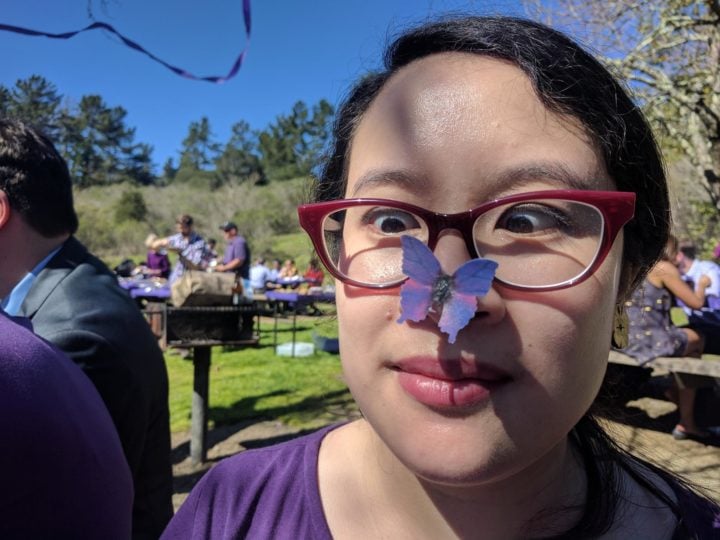
A consummate lover of books, tea, food and instant-speed kill spells, Michelle is a person of many passions. Her hobbies include cuddling cats, throwing pottery, and analyzing Magic lore from a literary perspective. She is also a co-host of the Vorthos comedy podcast, “The Loregoyfs,” and she comprises a full 25% of The Felidar Guardian (specifically the right hand, left ear and both scapulas). Her CMC is 2BWU, and her ETB trigger creates two 1/1 cats with lifelink and trample.

